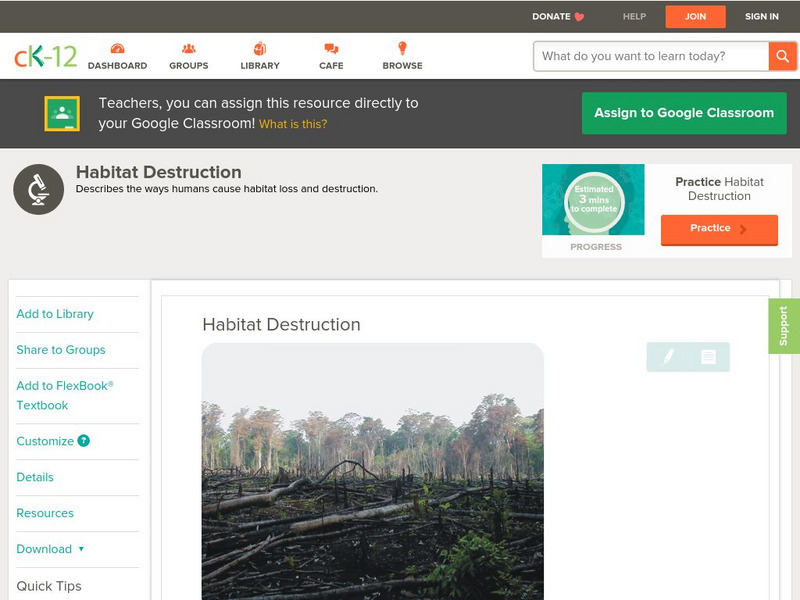Hi, what do you want to do?
Curated OER
Wappo Indians of Napa County
Third graders describe the American Indian nation in their local region long ago and in the recent past in terms of national identities, religious beliefs, customs, and various folklore traditions. They synthesize their findings into a...
Curated OER
Geography: Snow Cover on the Continents
Students create maps of snow cover for each continent by conducting Internet research. After estimating the percentage of continental snow cover, they present their findings in letters, brochures or Powerpoint presentations.
Curated OER
Connections Between World Events, Geography and the Human Quest for Knowledge
Students examine the relationship between innovations in geography and world events. Using maps, they report different information from a spatial perspective. They develop hypothesis about how man's quest for knowledge has impacted the...
Curated OER
Discovering the Past Using the Future: Remote Sensing and the Lost City of Ubar
Students identify and locate specific locations on the Arabian Peninsula, the Rub al Khali Desert, and present day Oman. They identify other names for the lost city of Arabia as Ubar, the Atlantis of the Sands, Iran, and the city of towers.
Curated OER
Animals of the Arctic
Students discover the animals that make the Canadian Arctic their home. In this Arctic animals lesson, students research the animals that live in the region and create posters that feature their findings.
Curated OER
Plants and Animals of Great Bay Animals and Plants of the Estuary
Students participate in a webquest about the plants and animals that inhabit an estuary. They role play as environmentalists researching this habitat and present the results of their research in a creative way.
Curated OER
The Four Seasons
Students examine four paintings by Robert Harris and identify the season portrayed. Using the characteristics for each season, they write a poem and create a drawing of their own. In groups, they describe the different types of...
Curated OER
Wind in the Willows
Students find further information about ows in their region or outside of their region. They prepare questions for Elders and community members in their own village and share their findings with students in other villages.
Curated OER
Vocabulary Practice: Words That Mean the Same
In this synonyms worksheet, students read ten sentences and analyze the words in bold. From three choices, students choose the word or phrase that means the same as the word in bold.
Curated OER
What Stages Do Insects Go Through?
Fourth graders observe mealworms over a period of time and record any changes they observe. They record any changes in color, length, behavior, and any other noticeable changes, identify the stages of the mealworms, and create a chart...
Curated OER
Reading Activity: How Children See the Future
In this reading worksheet, students read a selection titled, "How Children See the Future," then answer 10 multiple choice questions.
Curated OER
Climate Types
In this climate activity, high schoolers review how animals deal with different climate types and list the six climate groups in the Köppen Climate Classification System. This activity has 11 fill-in-the-blank questions.
Curated OER
Habitat Lap Sit
Fourth graders physically form a circle that shows the interconnectedness of the components of a habitat. They form circles and role play the parts of habitats.
Curated OER
Geography: World Dynamics
Students discuss and examine how the world is changing. After reading an article, they discover the immediate changes that have taken place and how they have effected living things. They complete a worksheet identifying the changes as...
Curated OER
ISM: Bertha Stenge Quilt Collection Activity: Design a Local Quilting Pattern
Students research quilt designs by Bertha Stenge. They make a list of things that they could stylize as a design motif. They create a quilt design based on local history and landmarks and sew it onto a pre-made quilt block or quilt.
Other
Mr. Palm: Ways People Have Adapted to and Modified Their Environment in Texas
Ways that Texans have altered the environment in order to improve their living conditions are presented, for example, through forest clearing, irrigation, and dams.
Science Education Resource Center at Carleton College
Serc: Mn Step: Seasonal Changes of a Tree
For this activity, students adopt a tree in the schoolyard and observe it throughout the year, recording the changes that they notice as the seasons pass. They will learn about the parts of the tree and notice how the tree is used by...
Library of Congress
Loc: Teachers: Geography and Its Impact on Colonial Life
Beginning with a discussion on how people adapt to or relocate to environments, this lesson encourages young scholars to explore why the Colonists settled in specific regions. In groups, students examine primary documents, analyzing...
Georgia Humanities Council and the University of Georgia Press.
New Georgia Encyclopedia: Coastal Shell Rings
This article explains what shell rings are and why they are important in understanding the daily life and culture of Archaic Period groups living in the southeast United States. Read about the theories of the ring sites in terms of...
University of Texas at Austin
University of Texas: Human Environmental Interactions [Pdf]
Inspired by Hemispheres' 2004 Teachers' Summer Institute, People and Place: Human-Geographic Relations, this curriculum unit was designed to address human adaptation to and modification of the environment. How have humans adjusted to...
Texas A&M University
Kinder Garden: Community Gardens
Many urban communities have learned to use unlikely places to develop gardens. At this site visit a community garden and learn how some people have adapted to the limitations of their environment.
Georgia Department of Education
Ga Virtual Learning: Ap Human Geography: Agricultural Geography
AP Human Geography course unit on Agricultural Geography discusses industrial farming, global agriculture and the green revolution.
CK-12 Foundation
Ck 12: Life Science: Habitat Destruction
[Free Registration/Login may be required to access all resource tools.] From a human point of view, a habitat is where you live, go to school, and go to have fun. Your habitat can be altered, and you can easily adapt. Most people live in...
Curated OER
Unesco: Japan: Historic Villages of Shirakawa Go and Gokayama
Located in a mountainous region that was cut off from the rest of the world for a long period of time, these villages with their Gassho-style houses subsisted on the cultivation of mulberry trees and the rearing of silkworms. The large...


























